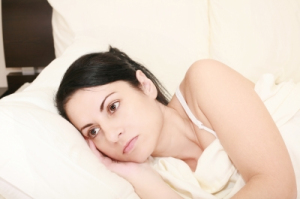Insomnia and the Paleo Diet

Photo courtesy of David Castillo Dominici / FreeDigitalPhotos.net
This week, in the space of the just 24 hours, I’ve received two separate comments about insomnia and the paleo diet. The first was from a work colleague who has been giving paleo a try, having seen the fun I’ve had with it. He told me that after just a week of paleo eating, he’s slept better than he has in years (he’s had a long history of battling with insomnia).
The second was a comment from a reader of Paleo Diet News, who commented on our Facebook page: “I’m 4 weeks into the paleo diet. Everything was going really well until I started developing disturbed sleep and now full-blown insomnia. Why is this happening? What can I do?”
So here’s a look at insomnia and the paleo diet. Needless to say, it’s unlikely that there’s a “right” answer (at least, one that’s “right” for everyone). But perhaps there are some consistent correlations….
Insomnia and Food
Oh, there’s a connection. In her book Healthy Sexy Happy, real foods advocate Nancy Deville writes of the links between food and sleep:
When you sleep, calming neurotransmitters are regenerated. Insomnia causes a deficit of calming neurotransmitters. Chronic insomnia compounds this deficit until you do not have enough calming neurotransmiiters to put and keep you asleep. Malnutrition is a major contributing factor to insomnia because any incoming building supplies will be used for immediate survival and nothing will be left over to make the neurotransmitters that will put you to sleep. If you’re not eating complete proteins, it’s likely that you’re not getting the precursors to calming neurotransmitters. L-tryptophan, an essential amino acid in meat, poultry and dairy induces sleep by metabolizing into the sleep hormone melatonin.
So far, so good - a full supply of amino acids is unlikely to be an issue on a good paleo diet. But for some paleo dieters, another potentially important food component might be lacking - carbohydrates. Nancy Deville goes on:
The pineal gland is a pea-size organ housed deep in the brain that identifies day and night by sensing light and dark. It regulates the body’s circadian rhythm, a daily rhythmic activity cycle , based on 24 hour intervals…(it) produces the hormone melatonin in periods of darkness, which makes you feel sleepy and aids in turning on the nighttime repair and rejuvenation processes. Carbs are necessary to facilitate the transmission of amino acids into the brain. If you’re suffering from insomnia, it may be as simple as adding in more complex carbs to your diet.
Give that many followers of the paleo diet do experience sleep issues several weeks or months into the diet - and many also follow a low-carb paleo approach - could this be the issue? It seems so, for certain people. But don’t assume that this is true for everyone - others report just the opposite scenario. In this question on PaleoHacks, one commenter (suffering from sudden, unexplained, week-long insomnia) notes that her sleep pattern got worse after adding carbs:
The odd thing is that I spent all of Feb and March eating less than 50g/carbs/day and slept like a baby. Now I’m probably around 100g/day.
The moral here seems to be - experiment. If insomnia is an issue for you, and you’re very low carb - try eating more. If you’re already eating a fair amount, try eating less - and monitor what happens.
Incidentally, Healthy Sexy Happy contains a full 16 pages on the topics of sleep and insomnia - well worth a look (the book’s a favourite of mine).
Other Factors
There seem to be a couple of other interesting approaches to treating insomnia in the paleosphere:
- Blogger and author of The Shangri-La Diet, Seth Roberts finally resolved his insomnia by moving his breakfast time back a few hours. When he went back to eating at the earlier time, the insomnia returned. He speculates that this could be to do with the body’s “food expectation” system - in preparing to eat at an early hour, it begins “waking up” in preparation - sometimes even hours before. Again, moving the time of our first meal of the day is a fairly simple thing to try out - so what’s to lose?
- In terms of supplementation, Paul and Shou Ching Jaminet, authors of The Perfect Health Diet, suggest magnesium and melatonin as natural supplements which can assist with falling asleep. Magnesium is a muscle relaxant, and melatonin is the hormone that triggers sleep. Be aware, however, that others suggest exercising particular caution when consuming melatonin - notably Mark Sisson in this post. I’ve tried melatonin once, and have to say - it gave me the weirdest dreams (although of course, I can’t be sure it was that).
- Speaking of Mark Sisson, you may be interested in checking out this guest post on his blog - Conquer Restless Nights With This Simple Sleep Cure.
Have you experienced insomnia whilst following a paleo diet? What tips do you have for improving sleep? Share your thoughts below!
Brian Cormack Carr is a freelance writer and coach whose mission in life is to help YOU do what you
were designed for.
His home on the web is YourPrimalLife.com where you will find more articles, freebies, and information about his online career-creation programme VitalVocation.com - 12 sessions of virtual coaching from Brian for just $20!
Twitter: @cormackcarr





